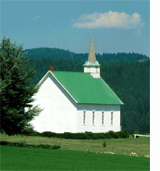The Lord's Prayer Revisited: 1 of 6
© 01.05.12 By David Eric Williams
 We live in troubled times. Our economy continues to falter with real unemployment well into the double digits. The moral fiber of the nation is badly frayed and popular culture continues its slide into hell. On the political front it seems each day brings a new threat to our liberty. In the relatively inconsequential banning of incandescent light bulbs to the startling declaration that American citizens - who otherwise are entitled under the Constitution to a speedy and public trial - are subject to arrest and indefinite military detention, our civil leaders declare themselves god.
We live in troubled times. Our economy continues to falter with real unemployment well into the double digits. The moral fiber of the nation is badly frayed and popular culture continues its slide into hell. On the political front it seems each day brings a new threat to our liberty. In the relatively inconsequential banning of incandescent light bulbs to the startling declaration that American citizens - who otherwise are entitled under the Constitution to a speedy and public trial - are subject to arrest and indefinite military detention, our civil leaders declare themselves god.
It is easy to look to political action as the answer to our problems and the rise of the tea party was supposed to turn the tide in favor of truth once and for all. Yet even the shellacking experienced by the left in 2010 did little to slow the advance of the god state. At some point Christians must realize that the answers to our nation's problems lie with another kingdom.
I am not talking about a union of church and state. I am not talking about a top-down imposition of Christian morality on society. Instead I refer to the duty of every believer to live all of life as unto the Lord. This does not preclude civic activity but includes our political action as that which must be done heartily as unto the Lord and not to men (Colossians 323). Nevertheless we cannot be lopsided in our Christian walk. No doubt, lasting, positive change in American culture is impossible unless Believers embrace the Lordship of Jesus Christ over all of life.
Many Christians are guilty of half measures in their commitment to Jesus Christ. Rather than live a robust bible-based Christianity some "Christians" have embraced American folk religion1 and refuse to a judge opinion and practice in the light of God's Word. As a result, the religious right bows the knee to moral conservatism rather than Christ. Rather than look to God's Word for guidance, folk religionists rely on worldly wisdom amended by religious feelings; for them, sincere spiritual sensitivity is primary.
American folk religion has steadily eroded the foundations of Christianity in this nation and has made what was formerly unacceptable now unobjectionable. Fringe beliefs have become mainstream and the term "Evangelical" no longer describes a faith founded upon God's Word. Experience trumps the Bible and tales of celestial travel, communicating with the dead "a fresh word for the end time church" and so on, lead the church ever deeper into the wasteland of folk religion. This trend threatens the integrity of the church more than outright apostasy.
In the articles that follow, we will examine Matthew 6:9-13 and discover that the Lord's Prayer (presented in covenant sequence2) guides us in communication with God - and our Christian walk. This exercise is not meant to be the definitive answer to our woes but a starting point, a springboard helping to propel us into a more profound relationship with our Lord and Savior Jesus Christ. Thus we will find that the Lord's Prayer provides Christians a basic map out of the folk religionists wilderness.
____________________
1. Robert Olson, professor of theology at George W. Truett Theological Seminary of Baylor University defines folk religion as "unreflective religious belief based largely, if not exclusively, on feelings (e.g., comfort), traditional folk ways (e.g., funeral practices), cliches (e.g., bumper sticker slogans) and devotional literature (including poems, songs, religion fiction, etc.). It thrives on urban myths ('evangelegends') and unverifiable stories passed around among the faithful. It is unreflective and even resists reflection (especially critical reflection)."
2. Meredith Kline, The Structure of Biblical Authority, (Grand Rapids: Eerdmans, 1972).
Entire Site Copyright © 2025 By David Eric Williams










